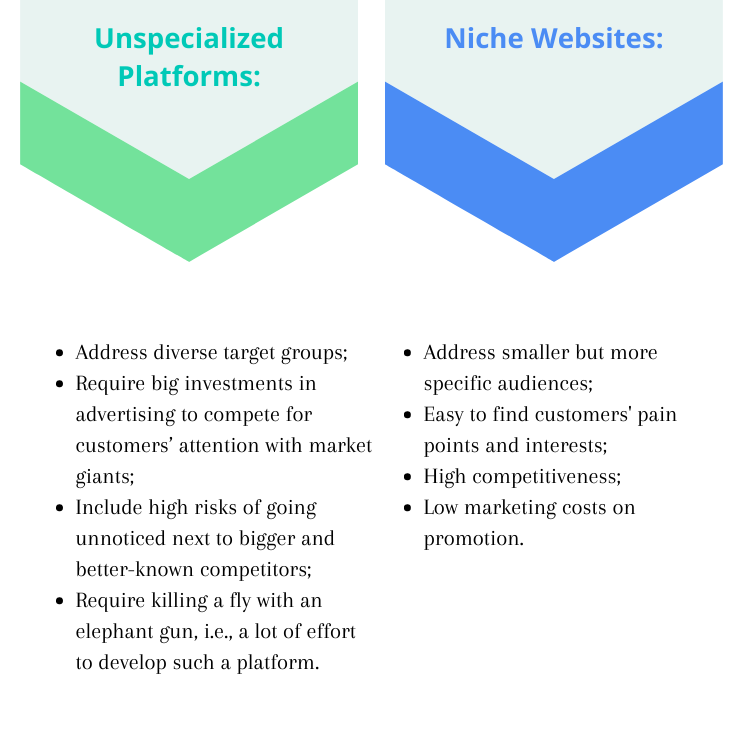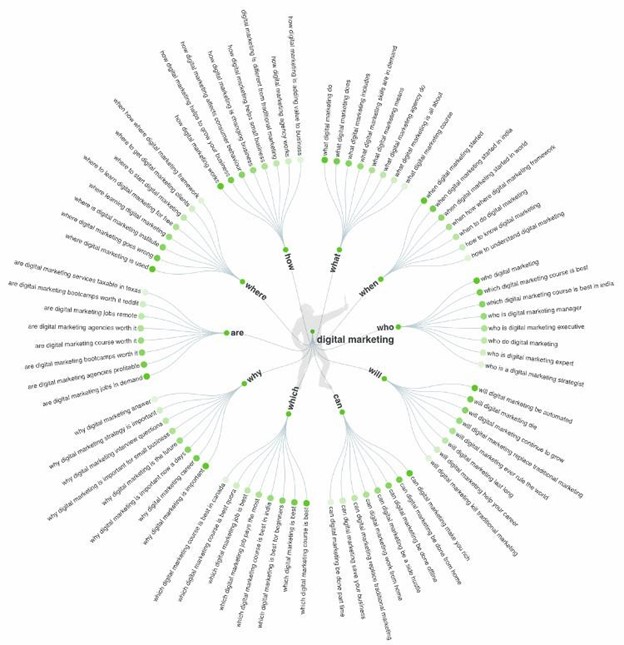How to Choose a Niche for an Influencer Platform
Tips on how to pick a niche for your influencer marketing platform.
A few tips on how to choose a niche for your future micro-jobs website.

Starting an online business involves making important decisions, one of which is a choice of niche.
When launching a niche micro-job website, there are a lot of factors to consider, and in this article, we’ll give you a few tips on how to choose a niche for a micro-jobs platform.
Let’s start without any further ado!
To begin with, let us explain why the choice of a niche is so important.
Some people mistakenly think that the more comprehensive and all-encompassing platform will attract more customers and thus bring more money to a website owner. However, this approach is nothing than erroneous.
“Less is more” is a core idea of contemporary design influenced by the minimalist movement. The same approach is valid for creating a website. Let’s compare the key characteristics of niche and unspecialized websites and see why opting for a specific sphere is a far better choice.

That’s why we highly recommend avoiding reinventing the wheel and instead focusing on finding your niche.
Let’s see how to do it in the next section.
So we’ve agreed that being a Jack of all trades isn’t the best business strategy when launching a freelance platform. If you want your micro-jobs website to succeed, here are several crucial moments to take into account.
Don’t just sit there and wait for some great ideas to come to your mind; instead, go online and search for all the available data on people’s interests, current trends, and top queries. Knowing what people are looking for will help you to define the market needs.
Here are some tools that you can use for your research:

Using these instruments may give you a hint of what direction to take when developing your micro-jobs platform.
By studying figures, you can check if there’s demand for a certain sphere. Then you can continue to search for all the valuable data to deepen your understanding of the topic. Sticking to a specific field will allow you to conduct extensive research and learn all the nuances of a particular niche.
Once you have accumulated enough information, you can identify what’s in high demand in the market and create a micro-jobs website to close this gap.
Learn from those who’ve already made it in the micro-jobs market: study business strategies, marketing techniques, successes and failures of all the most influential existing niche platforms.
Spare no effort to define the unique characteristics of these websites:
Finding the answers to these questions will help you figure out the winning strategies of different successful micro-jobs platforms. Use them as inspiration for building your own website. Analyze their strengths and think about how you can avoid similar weaknesses on your micro-jobs platform.
All this work will eventually enable you to come up with a bunch of great ideas for your niche website.
The next essential point is the uniqueness of your website.
As we mentioned above, one of the biggest threats when starting a new micro-jobs website is getting lost among the established key players in the market. Investing huge sums of money in advertising will not lead to significant results unless you can also offer your potential clients some more competitive services compared to other platforms.
You should make your micro-jobs website distinguishable in the market to gain the necessary visibility. Think of ways of providing extra value or adding unique features. For example, you may offer your customers lower service fees, focus on some extraordinary fields, guarantee top-quality services provided by exclusively experienced freelancers who have passed the platform’s selection process (like Toptal), etc.
Suppose you want to develop a micro-jobs website for voice-over actors. What can be your key characteristics? Maybe, you’ll offer the freelancers a fee-free first order or a discount for repeated projects with the same specialist for the customers. The choice is yours but do your best to find your highlight.
Think about the people who’ll use your services.
Remember that your website visitors fall into two categories:
Take into consideration their unique and different needs when building your website.
Find the answer to what their main pain points are.
Check out what people share on niche forums and in any communities specialized in your sphere of interest. If possible, ask them about their experiences and expectations:
Don’t hesitate to interview people you know about their needs and preferences. You may also ask people:
These are just a few questions you can ask your family, colleagues, and friends. Get creative and try to cover all the essential aspects in your survey.
Having followed the previous steps, you’ll know your potential clients’ requests and will be able to foresee what they’ll be willing to pay for. It’s better to think about all possible business models for your freelance marketplace before even launching a website.
Here are some of the most common monetization models for micro-jobs platforms:
Check out our other article to learn more about the most popular ways to monetize a service marketplace website.
Making decisions isn’t easy. It requires courage, knowledge, and luck. We hope this article gave you a few ideas on how to decide on a niche for your future micro-jobs website and now you have a better idea of what to do next.
If you haven’t chosen a theme for your micro jobs platform yet, you may consider TaskHive, it’s a versatile WordPress theme with tons of features right out of the box. You can check its overview to get a better idea of all the features.
You might also be interested to read about:
Tips on how to pick a niche for your influencer marketing platform.
A few tips on managing your business directory website.
A quick guide on how to make money with your WordPress peer-to-peer marketplace.